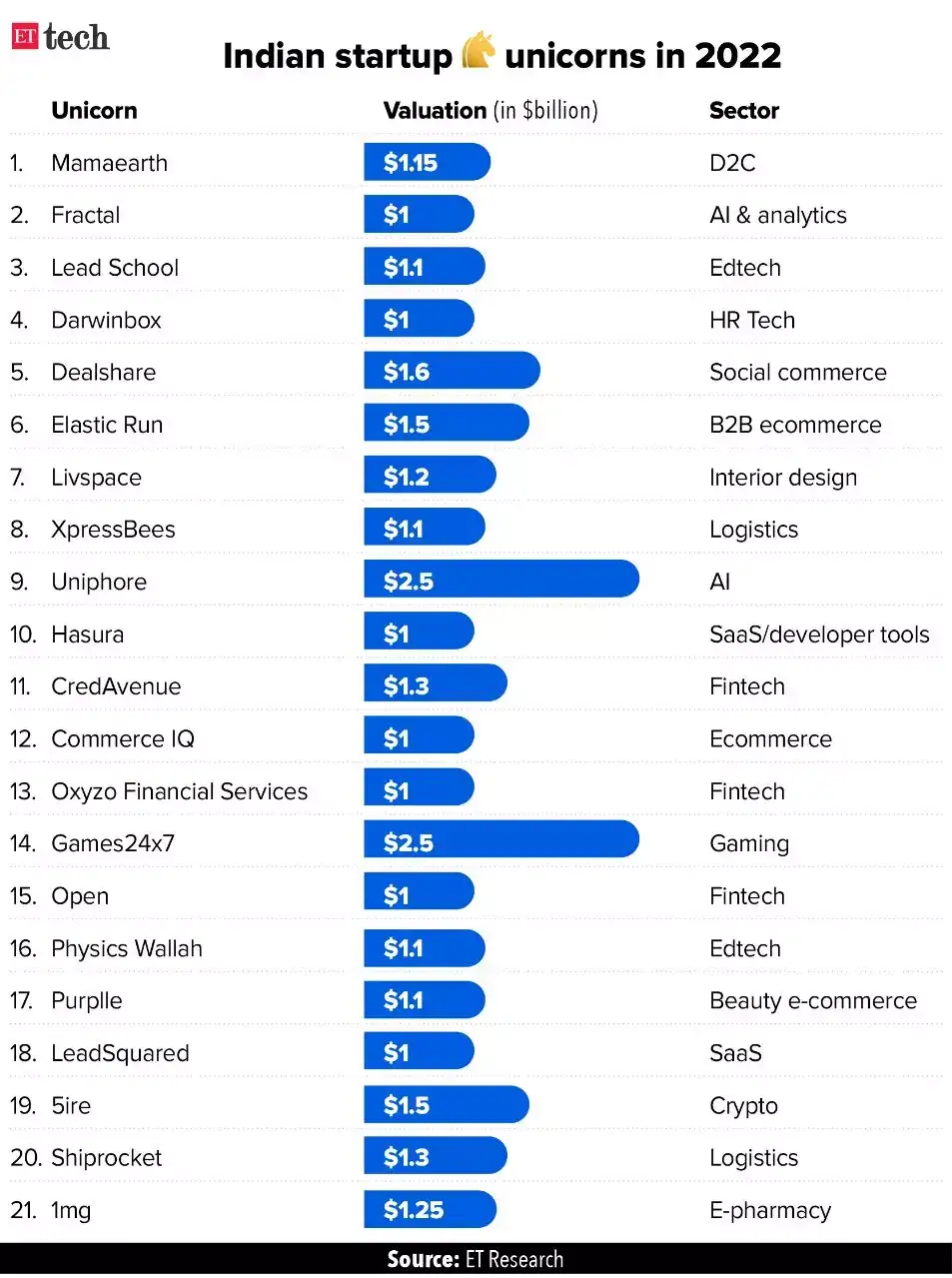Poor post-IPO performance of new-age startups also caused many of their peers to rethink their listing plans.
2022 vs 2021
Fund mobilisation through IPOs halved to nearly Rs 57,000 crore in 2022.
The collection would have been much lower if not for the mega Rs 20,557-crore LIC public offer, which constitutes as much as 35% of the total amount raised during the year.
Discover the stories of your interest

In comparison, 1.2 lakh crore was raised by 63 companies in 2021, which was the best IPO year in two decades.
Indian tech startups
raised over $42 billion in 2021, as per Orios Venture Partners’ report titled ‘The Indian Tech Unicorn Report 2021’.
The country saw 46 unicorns in 2021 alone, pushing the total number of unicorns to 90.
The report, which dubbed 2021 “a landmark year for Indian startups going public”, noted that India houses the third-largest startup ecosystem in the world with about 60,000 startups.
However, in 2022, the number of new-age startup IPOs dropped to the low single digits. As many as nine startups listed on the bonuses in 2021, while only two — Delhivery and Tracxn Technologies — went public this year.
Meanwhile, the list of startups that deferred going public grew longer as the months passed. Some of these were Snapdeal, Ola, Droom, MobiKwik, PharmEasy, Oyo, BoAt and Flipkart.
According to data from BSE, 88 IPOs were launched year-to-date, with 36 launching on the main board, while the remaining were on the SME segment.
Delhivery and Tracxn Technologies were the only two new-age technology companies in the 36 IPOs.
The LIC IPO was the largest ever issue in India at Rs 20,557 crore, followed by Delhivery (Rs 5,235 crore), Adani Wilmar (Rs 3,600 crore), Vedant Fashion (Rs 3,149 crore) and Global Health (Rs 2,205 crore).
Barring LIC and Delhivery, the big-size issues were negligible in 2022, with an average ticket size of less than Rs 1,000 crore.
New-age startups continue to bleed
In addition to the market volatility, startups also deferred their listing plans because of the performance of startups that went public in 2021, such as Zomato, Paytm and Nykaa.
According to industry experts, these new-age companies took to the bourses at relatively high valuations only to see immediate and sustained corrections.
The shares of One 97 Communications Ltd, the parent entity of financial services company Paytm, plunged to Rs 474 on December 23. Meanwhile, Paytm shares are down by 75% since its listing on November 18, 2021.
The stock crashed 27.4% on the first day after listing and images of its teary-eyed founder and CEO Vijay Shekhar Sharma went viral.
Shares of food delivery platform Zomato, the first startup unicorn to go public in 2021, also took a beating as investors expressed concerns over profitability and high cash burn. The stock was down 53%, trading at Rs 58.65 as of December 24, 2022.
FSN Ventures, the parent entity of beauty etailer Nykaa, is down around 56% year-to-date, while PB Fintech, which runs Policybazaar, is down 53%.
Logistics and supply chain company Delhivery’s shares have dropped by 40% since the company’s listing in May.
Collectively these five tech firms have wiped over $18 billion of investors’ wealth since listing, as per a
Bloomberg report.
Unicorn party ends
According to data compiled by Finbold, the number of unicorns in India dropped to 85 in 2022 from more than 100 in late 2021, amid global economic turmoil.
As per data from Venture Intelligence, India has
102 unicorns as of December 2022.
The pace of startups turning unicorn also dropped in 2022 with only 21 entering the coveted club.
 ETtech
ETtechExpectations for 2023
While the funding winter may be around for some time, the IPO market may be in for a busy year. Companies still need access to the markets, and venture capitalists will still need to cash out.
Optimism for next year is also driven by the outlook for the Indian economy, which is projected to grow by 6% in FY24, making it the world’s fastest-growing major economy.
Moreover, as per a report by market research and consultancy firm Redseer,
80 startups have the potential to go in for public listing in the next five years.
“India may see over 100 mature, large-scale profitable/path-to-profitability start-ups in the next five years. With about 20 of them already being listed, about 80 start-ups have the potential to look at an IPO journey,” Redseer said in the report.
























